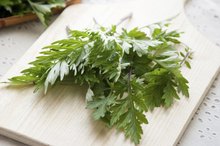What does fact checked mean?
At Healthfully, we strive to deliver objective content that is accurate and up-to-date. Our team periodically reviews articles in order to ensure content quality. The sources cited below consist of evidence from peer-reviewed journals, prominent medical organizations, academic associations, and government data.
- American Journal of Cardiology: Efficacy and Safety of Berberine for Congestive Heart Failure Secondary to Ischemic or Idiopathic Dilated Cardiomyopathy
- American Journal of Cardiology: Efficacy and Safety of Berberine for Congestive Heart Failure Secondary to Ischemic or Idiopathic Dilated Cardiomyopathy
- BMC Neuroscience: Berberine Chloride Can Ameliorate the Spatial Memory Impairment and Increase the Expression of Interleukin-1beta and Inducible Nitric Oxide Synthase in the Rat Model of Alzheimer's Disease
The information contained on this site is for informational purposes only, and should not be used as a substitute for the advice of a professional health care provider. Please check with the appropriate physician regarding health questions and concerns. Although we strive to deliver accurate and up-to-date information, no guarantee to that effect is made.
Berberine hydrochloride, also known as berberine HCL, is a dietary supplement that contains the natural plant substance berberine. Used frequently in non-traditional medical systems like Ayurvedic and Chinese herbal medicine, berberine has shown to be effective for treating a variety of conditions. A safety and efficacy study published in the July 2003 issue of the “American Journal of Cardiology” determined the supplement helped to improve the quality of life of patients with congestive heart failure with no apparent side effects or toxicity 2.
If you are experiencing serious medical symptoms, seek emergency treatment immediately.
Source
Berberine is a naturally occurring alkaloid chemical found in the roots and barks of certain herbs. The ancient Chinese herb Coptis chinensis French contains berberine. Barberry, an herb used by Indian folk medicine for more than 2,500 years also contains berberine. Other herbs known to contain berberine include goldenseal, Oregon grape, phellodendron amurense and yerba mansa.
- Berberine is a naturally occurring alkaloid chemical found in the roots and barks of certain herbs.
Benefits
Chinese Almonds for Weight Loss
Learn More
The University of Maryland Medical Center reports that berberine exhibits antimicrobial, anti-inflammatory, hypotensive, sedative and anti-convulsive effects. Some patients take berberine HCL to treat or prevent fungal, parasitic, yeast, bacterial or viral infections. Although originally used to treat infections of the digestive tract that cause diarrhea, in 1980 researchers discovered that berberine lowers blood sugar levels, as reported by a study published in the October 2007 issue of the “American Journal of Physiology Endocrinology and Metabolism.” Berberine may also lower cholesterol levels and blood pressure according to information provided by Dr. Ray Sahelian, author and herbal product formulator 1.
Effects
Berberine can relieve diarrhea by fighting off the infection causing the bacteria. Berberine helps regulate blood sugar by increasing sensitivity to insulin – the hormone required for cells to uptake and use the glucose for energy. Berberine HCL supplements also affect blood glucose levels by increasing the process of glycolysis in which the body converts glucose into pyruvate to produce energy. Berberine helps lower blood cholesterol levels by stabilizing the LDL cholesterol receptors on liver cells and inhibiting the production of cholesterol in the liver.
- Berberine can relieve diarrhea by fighting off the infection causing the bacteria.
- Berberine HCL supplements also affect blood glucose levels by increasing the process of glycolysis in which the body converts glucose into pyruvate to produce energy.
Toxicity
The Health Benefits of the Plantain Leaf
Learn More
Because berberine HCL is a dietary supplement, it is not regulated as by the U.S. Food and Drug Administration as a pharmaceutical. Studies, like the one published in the “American Journal of Physiology Endocrinology and Metabolism,” tested the effects of berberine in rats and found that it was not toxic to cells 1. A study conducted using human subjects and published in “American Journal of Cardiology” confirms that berberine does induce physiologic benefits in humans without producing negative side effects 3. Despite these positive results, before taking any dietary supplement, consult your doctor.
Related Articles
References
- American Journal of Physiology Endocrinology and Metabolism: Berberine Induces Glucose Metabolism Through Induction of Glycolysis
- American Journal of Cardiology: Efficacy and Safety of Berberine for Congestive Heart Failure Secondary to Ischemic or Idiopathic Dilated Cardiomyopathy
- Dr. Ray Sahelian: Berberine Supplements Health Benefits and Side Effects
- BMC Neuroscience: Berberine Chloride Can Ameliorate the Spatial Memory Impairment and Increase the Expression of Interleukin-1beta and Inducible Nitric Oxide Synthase in the Rat Model of Alzheimer's Disease
- Abidi P, Chen W, Kraemer FB, Liu J. The medicinal plant goldenseal is a natural LDL-lowering agent with multiple bioactive components and new action mechanisms. J Lipid Res 2006; 47: 2134–2147.
- Cicero AFG, Erkek S. Berberine: metabolic and cardiovascular effects in preclinical and clinical trials. Nutr Diet Supp 2009;1:1-10
- Natural Standard. (2015). Berberine [Monograph].
- Pirillo A, Catapano AL. Berberine, a plant alkaloid with lipid and glucose-lowering properties: from in vitro evidence to clinical studies. Atherosclerosis 2015;243:449-461.
Writer Bio
Stephanie Chandler is a freelance writer whose master's degree in biomedical science and over 15 years experience in the scientific and pharmaceutical professions provide her with the knowledge to contribute to health topics. Chandler has been writing for corporations and small businesses since 1991. In addition to writing scientific papers and procedures, her articles are published on Overstock.com and other websites.









